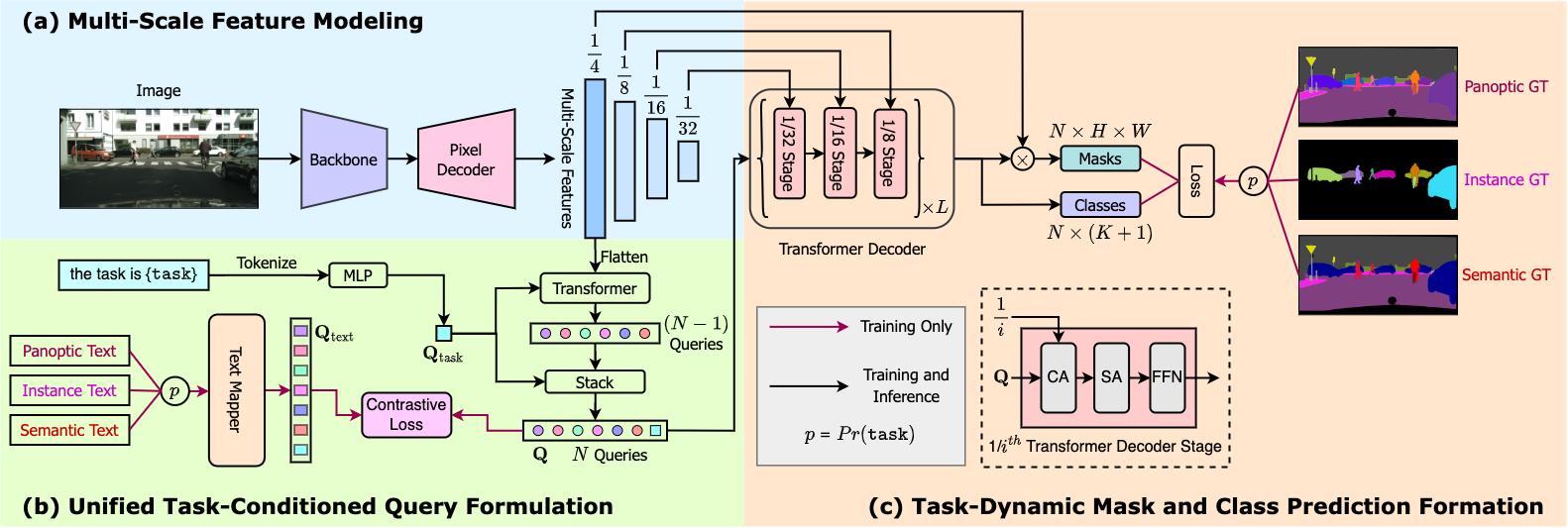File size: 3,749 Bytes
36c5ca2 d23b626 36c5ca2 0dea77d 0f87c66 0dea77d c770a34 0dea77d 0f87c66 0dea77d 5ad795b 0dea77d 5ad795b 0dea77d 3a26301 0dea77d 49c5bdd 5ad795b 0dea77d 3a26301 0dea77d 49c5bdd 5ad795b 0dea77d 3a26301 0dea77d 49c5bdd 5ad795b 0dea77d |
1 2 3 4 5 6 7 8 9 10 11 12 13 14 15 16 17 18 19 20 21 22 23 24 25 26 27 28 29 30 31 32 33 34 35 36 37 38 39 40 41 42 43 44 45 46 47 48 49 50 51 52 53 54 55 56 57 58 59 60 61 62 63 64 65 66 67 68 69 70 71 72 73 74 75 76 77 78 79 |
---
license: mit
tags:
- vision
- image-segmentation
datasets:
- ydshieh/coco_dataset_script
widget:
- src: https://huggingface.co/datasets/shi-labs/oneformer_demo/blob/main/coco.jpeg
example_title: Person
- src: https://huggingface.co/datasets/shi-labs/oneformer_demo/blob/main/demo_2.jpg
example_title: Airplane
- src: https://huggingface.co/datasets/shi-labs/oneformer_demo/blob/main/demo.jpeg
example_title: Corgi
---
# OneFormer
OneFormer model trained on the COCO dataset (large-sized version, Swin backbone). It was introduced in the paper [OneFormer: One Transformer to Rule Universal Image Segmentation](https://arxiv.org/abs/2211.06220) by Jain et al. and first released in [this repository](https://github.com/SHI-Labs/OneFormer).

## Model description
OneFormer is the first multi-task universal image segmentation framework. It needs to be trained only once with a single universal architecture, a single model, and on a single dataset, to outperform existing specialized models across semantic, instance, and panoptic segmentation tasks. OneFormer uses a task token to condition the model on the task in focus, making the architecture task-guided for training, and task-dynamic for inference, all with a single model.

## Intended uses & limitations
You can use this particular checkpoint for semantic, instance and panoptic segmentation. See the [model hub](https://huggingface.co/models?search=oneformer) to look for other fine-tuned versions on a different dataset.
### How to use
Here is how to use this model:
```python
from transformers import OneFormerProcessor, OneFormerForUniversalSegmentation
from PIL import Image
import requests
url = "https://huggingface.co/datasets/shi-labs/oneformer_demo/blob/main/coco.jpeg"
image = Image.open(requests.get(url, stream=True).raw)
# Loading a single model for all three tasks
processor = OneFormerProcessor.from_pretrained("shi-labs/oneformer_coco_swin_large")
model = OneFormerForUniversalSegmentation.from_pretrained("shi-labs/oneformer_coco_swin_large")
# Semantic Segmentation
semantic_inputs = processor(images=image, task_inputs=["semantic"], return_tensors="pt")
semantic_outputs = model(**semantic_inputs)
# pass through image_processor for postprocessing
predicted_semantic_map = processor.post_process_semantic_segmentation(outputs, target_sizes=[image.size[::-1]])[0]
# Instance Segmentation
instance_inputs = processor(images=image, task_inputs=["instance"], return_tensors="pt")
instance_outputs = model(**instance_inputs)
# pass through image_processor for postprocessing
predicted_instance_map = processor.post_process_instance_segmentation(outputs, target_sizes=[image.size[::-1]])[0]["segmentation"]
# Panoptic Segmentation
panoptic_inputs = processor(images=image, task_inputs=["panoptic"], return_tensors="pt")
panoptic_outputs = model(**panoptic_inputs)
# pass through image_processor for postprocessing
predicted_semantic_map = processor.post_process_panoptic_segmentation(outputs, target_sizes=[image.size[::-1]])[0]["segmentation"]
```
For more examples, please refer to the [documentation](https://huggingface.co/docs/transformers/master/en/model_doc/oneformer).
### Citation
```bibtex
@article{jain2022oneformer,
title={{OneFormer: One Transformer to Rule Universal Image Segmentation}},
author={Jitesh Jain and Jiachen Li and MangTik Chiu and Ali Hassani and Nikita Orlov and Humphrey Shi},
journal={arXiv},
year={2022}
}
```
|